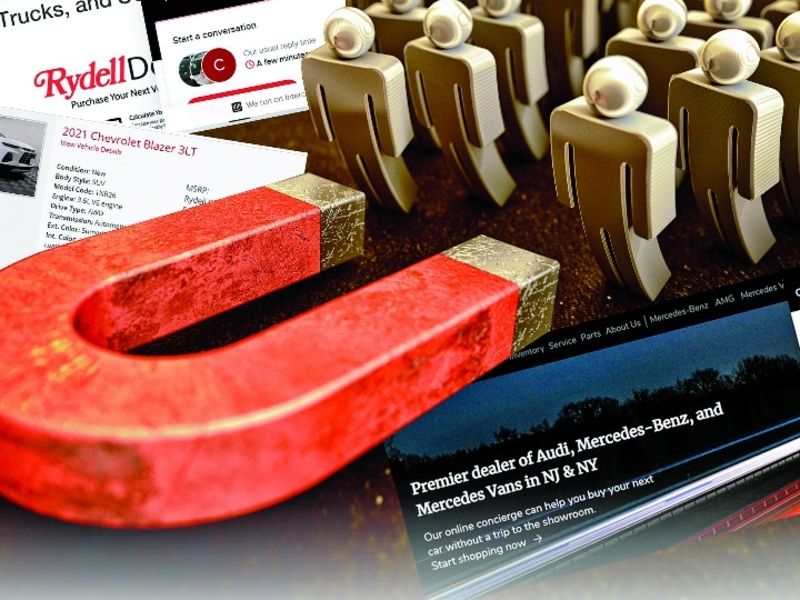
Customers browsing inventory aren’t met with a traditional lead form on Rydell Auto Center of Grand Forks’ website.
Instead, beneath a payment calculator is a black button with the words: “Ask an expert.” Click on it, and a chat window pops up, prompting customers to choose the dealership department they’re looking for and telling them that the usual response time is a few minutes.
A live employee responds on average in less than a minute, said Morgan Hibma, marketing director of the three-store group in North Dakota. A lead form is still there, tucked away on a contact page. But Hibma said it’s being phased out, and shoppers won’t find it when checking out the detail page for a new Chevrolet Blazer.
Rydell is experimenting with replacing the lead form — which asks customers for contact information to view a price, for instance, or to get more information about a vehicle — with real-time communication through chat and text.
The dealership group and some others are exploring ways to engage with customers while they’re actively shopping vs. trying to reach them after their website visit. Proponents say the approach can improve consumers’ overall experience — and help prevent sales lost to another dealership that responds faster.
“It’s not us trying to get ahold of them again and them saying they’re busy,” Hibma said. As a customer, “the last thing I want to do is fill out a form, hope they call me back, and now I’m in a meeting.”
Dealership technology providers and consultants told Automotive News there are multiple approaches to communicating with customers in real time, from chatbots that can quickly guide customers to information to live chats with business development agents on the website, on Facebook or via text message.
Advocates say the goal is to give customers the information they want at the moment they’re looking for it.
“When you put a form-fill on your website, you’re basically telling customers, ‘Hey, fill this out, go sit in the waiting room, and I might get back to you in two hours,’ ” said Tim Cox, senior vice president of sales for CarNow, a vendor that has replaced some traditional dealership lead forms with a bot-powered chat platform supported by live agents.
The current website lead experience is incongruous with the in-person experience, said David Kain, president of Kain Automotive, a dealership training company that is working with Podium, a company that helps dealerships manage customer interactions, to develop training around a messaging-first strategy.
Customers who walk into a showroom are quickly engaged in a conversation with an employee. But dealership lead forms often present the opposite experience, Kain said, adding that “it’s almost like going to Amazon and them saying, ‘Well, let me get back to you.’ ”
Dealers and software vendors often point to the customer experiences offered by tech giants Amazon and Apple as examples of the convenience and simplicity they aspire to reach as dealerships get better at transacting online.
Some dealers and technology providers said messaging online in real time is akin to the engagement that happens with a customer who calls a dealership and that it can allow employees to intervene before potential buyers abandon the website at a form page.
ActivEngage, a company that manages messaging for dealerships, has embedded chat functions into vehicle detail pages in partnership with some dealership website providers. Over a 15-month period through the end of 2020, dealerships that enabled chat on vehicle pages saw a 6.2 percent increase in leads, said Eric Schlesinger, ActivEngage’s chief revenue officer.
“If we can bring the human element back into the dealer website and the car-buying process, then, again, we have a higher probability of getting that consumer to transact with that dealer,” Schlesinger said.
Last year, Rydell employees successfully connected with about two-thirds of customers who submitted a lead form, Hibma said. Since the “Ask an expert” function launched in August, a dealership employee communicates directly with customers browsing the website close to 80 percent of the time, she said.
Benzel-Busch Motor Car Corp., with three franchised new-vehicle dealerships in New York and New Jersey, developed a chat platform that, once fully built, will allow a consumer to connect through a store website, Facebook Messenger, WhatsApp and mobile text messaging, group President Joseph Agresta said. The first phase of the platform went live in early April.
Traditional lead forms can be useful when customers reach out after business hours or don’t have time to chat and are willing to wait for an emailed reply, Agresta said. But in most cases, he said, a form request interrupts the buying process by asking a customer to wait for a reply when a real-time conversation would keep it moving.
“It’s like asking them to leave your dealership,” he said. “We would never do that [in person], but that’s kind of what we’re doing on the website.”

